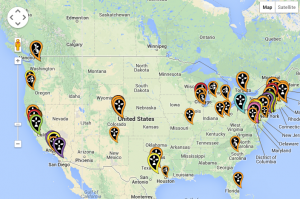Animals Subscribe
A selection of initiatives, blogs, resources and communities on Jewcology which focus on animals.
From the Blogs
Tnuva Admission of Inherent Animal Abuses Should Get Dietary Issues Onto the Jewish Agenda
Pauline Dubkin Yearwood and Richard Schwartz "Slaughtering by its very nature causes the animals great suffering." Who said this? A vegan activist or someone from an animal rights group? That’s what you'd think, but prepare to be shocked: The statement was made by a major Israeli dairy and meat producer, Tnuva. The company is currently the defendant in two independent class action suits related to the mistreatment of animals at its Beit She'an slaughterhouse, where it produces meat under the name Adom Adom. The ...
Do Torah Teachings Justify Animal Exploitation?
DO TORAH TEACHINGS JUSTIFY ANIMAL EXPLOITATION? Richard H. Schwartz, Ph.D. Many apologists for the exploitation of animals seek justification in scripture, but their presumption is largely due to the misunderstanding of two important Torah verses that, when properly conceived, actually endorse the struggle to improve conditions for animals. The first misunderstanding is that the Torah teaching that humans are granted dominion over animals (Genesis 1:26) gives us a warrant to treat them in whatever way we may wish. However, Jewish tradition ...
The Pearlstone Apprenticeship Experience
The opportunity to live and work in an immersive Jewish community first drew me to the Pearlstone Center in the winter of 2012. When a few months later conversation about creating a seven month immersive experience began to percolate I was ecstatic about the opportunity to be a part of making it come to life. Today Pearlstone’s Integrated Sustainability Apprenticeship is seven weeks into its inaugural season, and hosts eight fantastic apprentices who are transforming our farm, retreat center and the broader Jewish community whom we have the pleasure of ...
A Fictional Dialogue on Shavuot Night About Vegetarianism
Richard Schwartz For many years Danny Shapiro looked forward to staying up all night at his synagogue with his friends on the first night of Shavuot, hearing talks about and discussing Torah teachings. This year he especially anticipated this annual commemoration of the giving of the Torah on Mount Sinai, because Rabbi Greenberg would be meeting with Danny and other college students for an hour at 3 AM to answer any questions on Judaism that they brought up. Danny had recently become a vegetarian and had done a lot of background reading on Jewish ...
Does The Bible/Torah Condone Meat Eating? Take a Closer Look at Genesis 9:3
Torah-literate carnivores cling tenaciously to a slender verse in the Book of Genesis to justify their consumption of animal flesh. Genesis 9:3 is the Biblical invitation to a Texas buffet. It plainly states, “Every creature that lives shall be yours to eat.” The Beet-Eating Heeb cannot pretend that this verse doesn’t exist. In fact, faithful readers of his blog will tell you that he has never, ever stated that Judaism or Christianity prohibits meat eating. But he is not afraid to address Genesis 9:3 head-on – and show that carnivores ...
Shavuot and Vegetarianism
Shavuot and Vegetarianism By Richard H. Schwartz There are many connections between vegetarianism and the important Jewish festival of Shavuot: 1. Shavuot is described as "z'man matan Toratenu" (the season of the giving of our law (the Torah)). It is this Torah that has in its very first chapter God's original, strictly vegetarian, dietary regimen: "And God said: 'Behold, I have given you every herb yielding seed which is on the face of all the earth, and every tree, in which is the fruit of a tree yielding seed - to you it shall be for food'" (Genesis 1:29). ...
A Shavuot Message: Applying Torah Values To Our Diets
A Shavuot Message: Applying Torah Values To Our Diets By Richard H. Schwartz Since Shavuot is z'man matan Torateinu (the commemoration of the giving of the Torah to the Israelites on Mount Sinai), many dedicated religious Jews admirably stay up the entire first night of Shavuot to hear talks about and discuss Torah teachings. Among these Torah teachings are that Jews should preserve human health, treat animals with compassion, protect the environment, conserve natural resources, help hungry people, and pursue peace. By becoming vegetarians, and ...
Lag B’Omer and Vegetarianism
Lag B’Omer & Vegetarianism: Making Every Day Count Daniel Brook & Richard H. Schwartz Lag B’Omer, which begins after sundown on Saturday, April 27 in 2013, is considered a minor Jewish holiday, but even a minor holiday provides valuable lessons and is worth celebrating. A great way to celebrate Lag B’Omer is through vegetarianism, as Lag B’Omer has many vegetarian connections. Lag B’Omer represents the 33rd day of the counting of the omer, the 49 days from the second day of Passover and Shavuot, reminding us of the ...
Animal & Human Relationships
Two years ago, we deicded to add goats to our farm for milk production and also for the educational value they could bring to visitors. We started by buying two does, which Elan picked by spending a significant amount of time at the breeders, and taking home the two friendliest goats there. We kept them and brought them up to weight, and then we bred them to get them milking. When they delivered, they delivered three boys and one girl. Which raised the question, what should we do with the boys? The two options were: sell them for meat, or raise them as ...
Ritual Slaughter
Blog post by Jacob Siegel, Jewish Farm School Group Leader and rabbinical student ------------------------------------ On March 6th, we invited students on two Jewish Farm School trips in New Orleans to participate in a shechita, a ritual slaughter of chickens. Jewish tradition calls for all kosher meet to undergo a specific process of slaughter, always done in person by a trained and certified professional with a very sharp knife. All kosher meat produced across the world has been slaughtered in the same manner. Yet few people have had the opportunity to see it ...
Ritual Slaughter
Blog post by Jacob Siegel, Jewish Farm School Group Leader and rabbinical student ------------------------------------ On March 6th, we invited students on two Jewish Farm School trips in New Orleans to participate in a shechita, a ritual slaughter of chickens. Jewish tradition calls for all kosher meet to undergo a specific process of slaughter, always done in person by a trained and certified professional with a very sharp knife. All kosher meat produced across the world has been slaughtered in the same manner. Yet few people have had the opportunity to see it ...
Environmental Tip of the Week: 1.3 billion chickens
Cross posted from Environmental Tip of the Week Take two seconds to take action! I received the following email from Environment America: 1.3 billion chickens. 62 million hogs. 18 million head of cattle. Those are just some of the animals living in factory farms in the U.S. And these animals create more waste each year than the top 100 American cities combined. Help us clean up factory farms. "Ticking time bombs of manure" -- that’s the description Karen Hudson, a resident of Elmwood, Illinois, gave to factory farms ...
Environmental Tip of the Week: 1.3 billion chickens
Take two seconds to take action! I received the following email from Environment America: 1.3 billion chickens. 62 million hogs. 18 million head of cattle. Those are just some of the animals living in factory farms in the U.S. And these animals create more waste each year than the top 100 American cities combined. Help us clean up factory farms. "Ticking time bombs of manure" -- that’s the description Karen Hudson, a resident of Elmwood, Illinois, gave to factory farms when one spewed two million tons of raw, toxic ...
Parshat Tzav: How Meat Consumption Today Differs from The Time of the Mishkan (Sanctuary) in the Wilderness
Parshat Tzav: How Meat Consumption Today Differs from The Time of the Mishkan (Sanctuary) in the Wilderness Richard H. Schwartz, PhD And that which is left thereof [from the meal-offering] shall Aaron and his sons eat; it shall be eaten without leaven in a holy place; in the tent of meeting they shall eat it. . . . it is most holy as the sin-offering and the guilt-offering. Leviticus 6:9.10 When the Jewish people were in the wilderness before they entered the land of Israel, the consumption of meat was associated with holiness. Every piece of meat ...
Meet the Pearlstone Goats!
Shalom readers! Winter may be a slow time for animals, vegetables, and people, but here at the farm at the Pearlstone Center, things are picking up. One of the biggest and exciting stories from the animal pasture is that we currently have between three and six pregnant goats (G-d willing)! Blood tests will confirm exact numbers in a week or two, as our vet’s ultrasounds were only definitive for three. We expect them to begin kidding in late April and finish in early June. We don’t artificially inseminate our goats but rather bring our does to two ...
Darkness Upon the Face of the Deep
Darkness upon the Face of the Deep –חשך על פני תהום Rabbi Ed Rosenthal “In the Beginning God created the heavens and the earth. And the earth was null and void, and darkness was upon the face of the deep. And the Spirit of God hovered on the surface of the water.” (Gen.1:1-2). While we are taught that God is omnipresent and there is no place where the Divine presence does not dwell; there are few places that evoke a spiritual experience or a connection with the Divine more surely than the surface of water. ...
New Year of Jewish Learning on the Environment Materials Released!
The Twelfth topic in the Year of Jewish Learning on the Environment, Genesis and Human Stewardship of the Earth, has just been released! In the first chapter of Genesis, twice in three verses, G-d speaks of humans ruling over other living beings. In the second instance, after creating Adam and Eve, G-d blesses them, saying "Be fruitful and multiply, fill the earth and subdue it, and have dominion over the fish of the sea, and over the birds of the sky, and over every living thing that moves upon the earth." What does it mean for humans to subdue the ...
Earth Etude for 29 Elul
May We Open Photos by Gabi Mezger Text by Rabbi Katy Allen May we all unfold and open our hearts. May we bloom and blossom in colors vivid and energetic. May we find butterflies in our midst, seeking our sweetness. Thank you for traveling through Elul with us. Thank you to all those who wrote and all those who read. Shanah tovah u'm'tukah l'chulam. May you all have ...
Earth Etude for 20 Elul
One Sky by Nyanna Susan Tobin "We are all a family under one sky, a family under one sky." Malvena Renolds wrote and sang this song in the 60's. It had a life of it's own and has travelled around the world. I didn't always see the sky. Earthly chores, right of passage, short term goals, shopping, fitting in..... Now I sit on a dock at Lake Cochituate. My eyes can scan the blue waters far away to a thin band of dark trees and the Route 30 bridge. The sky is big and open, a mirror of the lake without ...






